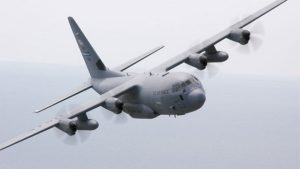
There will be tours aboard a hurricane hunter aircraft
The official start to the 2017 hurricane season is fast approaching, and the US National Oceanic and Atmospheric Administration (NOAA) and the US Air Force Reserve will from today host a series of events to help communities in Mexico and the Caribbean prepare for the season and weather the coming storms.
Grand Cayman, Turks and Caicos and Puerto Rico are among the stops.
NOAA hurricane specialists, including National Hurricane Centre (NHC) director Rick Knabb will provide information to residents of vulnerable communities about hurricane preparedness and resilience. Tours of the Air Force Reserve Command’s WC-130J “Hurricane Hunter” will offer an opportunity to learn how scientists collect hurricane information.
“Several Caribbean countries were severely damaged last year by Hurricane Matthew and Hurricane Otto,” Knabb said. “Another season is just weeks away and we have to be prepared.
“Simply hoping one of these storms won’t hit your community is not a good plan.”
During hurricanes, military air crews fly state-of-the-art WC-130J aircraft directly into the core of tropical cyclones to gather data that are critical for forecasting a hurricane’s intensity and landfall.
The data are sent in real time via satellite from the aircraft directly to the NHC for analysis and use by hurricane forecasters.
“This data is vital in improving storm track models, which plays a critical role in alerting coastal residents about potential hazards,” said Lt. Col. Kaitlyn Woods, 53rd Weather Reconnaissance Squadron chief meteorologist.
“The Caribbean Hurricane Awareness Tour educates the public not only about our mission but also of the importance of being prepared.”
The Atlantic hurricane season runs June 1 to November 30, but it got an early start with the formation of the short-lived Tropical Storm Arlene last week.
